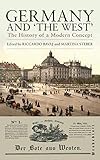Germany and 'The West' : The History of a Modern Concept / ed. by Martina Steber, Riccardo Bavaj.
Material type: TextPublisher: New York ; Oxford : Berghahn Books, [2015]Copyright date: ©2015Description: 1 online resource (328 p.)Content type:
TextPublisher: New York ; Oxford : Berghahn Books, [2015]Copyright date: ©2015Description: 1 online resource (328 p.)Content type: - 9781782385974
- 9781782385981
- 909/.09821 23
- DD67 .G49 2015
- DD67 .G49 2017
- online - DeGruyter
| Item type | Current library | Call number | URL | Status | Notes | Barcode | |
|---|---|---|---|---|---|---|---|
 eBook
eBook
|
Biblioteca "Angelicum" Pont. Univ. S.Tommaso d'Aquino Nuvola online | online - DeGruyter (Browse shelf(Opens below)) | Online access | Not for loan (Accesso limitato) | Accesso per gli utenti autorizzati / Access for authorized users | (dgr)9781782385981 |
Frontmatter -- Contents -- Preface -- Introduction: Germany and ‘the West’ The Vagaries of a Modern Relationship -- Part 1 Rises and Silences of ‘the West’ -- Chapter 1 In Search of ‘the West’ The Language of Political, Social and Cultural Spaces in the Sattelzeit, from about 1770 to the 1830s -- Chapter 2 The Kaiserreich and the Kulturländer: Conceptions of the West in Wilhelmine Germany, 1890–1914 -- Chapter 3 The First World War and the Invention of ‘Western Democracy’ -- Chapter 4 Perceptions of the West in Twentieth-Century Germany -- Part 2 East–West Entanglements -- Chapter 5 Russian and German Ideas of the West in the Long Nineteenth Century: Entanglements of Spatial Identities -- Chapter 6 ‘Orient’ and ‘Occident’, ‘East’ and ‘West’ in the Discourse of German Orientalists, 1790–1930 -- Chapter 7 German Jews and the West: Identification, Dissimilation and Marginalization around the Turn of the Century -- Part 3 Liberal Ambiguities and Strategies of ‘Westernization’ -- Chapter 8 Between East and West? A Liberal Dilemma, 1830–1848/49 -- Chapter 9 Before ‘the West’ Rudolf von Gneist’s English Utopia -- Chapter 10 Weimar and ‘the West’ Liberal Social Thought in Germany, 1914–1933 -- Chapter 11 Germany and ‘Western Democracies’ The Spatialization of Ernst Fraenkel’s Political Thought -- Part 4 Nationalist Self-Centredness and Conservative Adaptations -- Chapter 12 ‘The West’ in German Cultural Criticism during the Long Nineteenth Century -- Chapter 13 No Place for ‘the West’ National Socialism and the ‘Defence of Europe’ -- Chapter 14 ‘The West’, Tocqueville and West German Conservatism from the 1950s to the 1970s -- Part 5 Socialists between ‘East’ and ‘West’ -- Chapter 15 ‘The West’ as a Paradox in German Social Democratic Thought: Britain as Counterfoil and Model, 1871–1945 -- Chapter 16 Bridge over Troubled Water German Left-Wing Intellectuals between ‘East’ and ‘West’, 1945–1949 -- Chapter 17 Antipathy and Attraction to the West and Western Consumerism in the German Democratic Republic -- Selected Bibliography -- Contributors -- Index
restricted access online access with authorization star
http://purl.org/coar/access_right/c_16ec
“The West” is a central idea in German public discourse, yet historians know surprisingly little about the evolution of the concept. Contrary to common assumptions, this volume argues that the German concept of the West was not born in the twentieth century, but can be traced from a much earlier time. In the nineteenth century, “the West” became associated with notions of progress, liberty, civilization, and modernity. It signified the future through the opposition to antonyms such as “Russia” and “the East,” and was deployed as a tool for forging German identities. Examining the shifting meanings, political uses, and transnational circulations of the idea of “the West” sheds new light on German intellectual history from the post-Napoleonic era to the Cold War.
Mode of access: Internet via World Wide Web.
In English.
Description based on online resource; title from PDF title page (publisher's Web site, viewed 25. Jun 2024)


